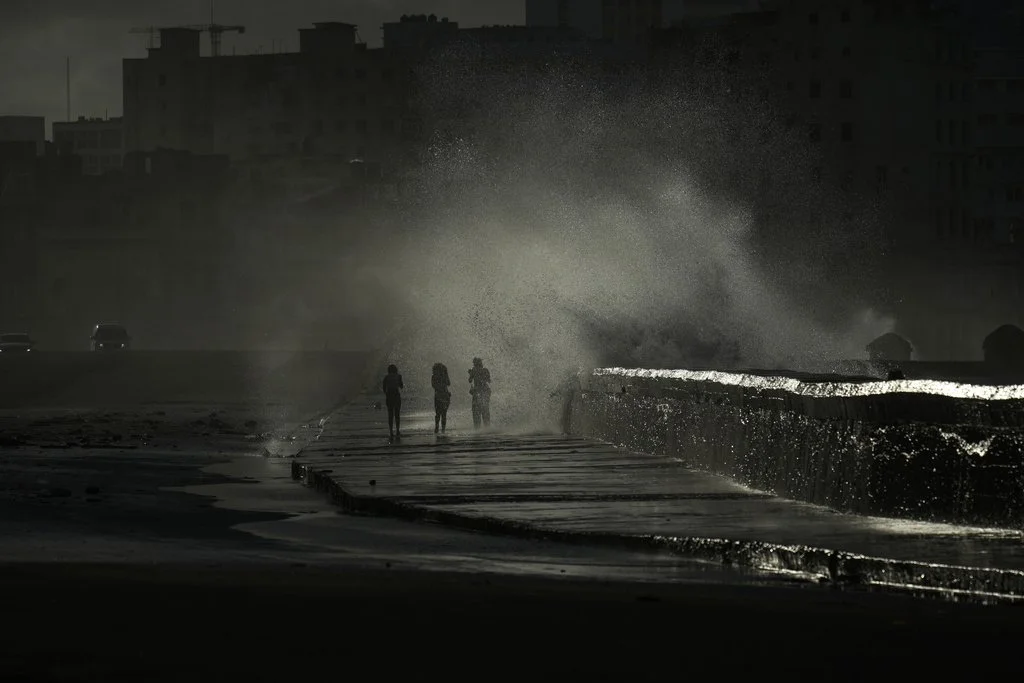Blackout in Cuba Leaves 10 million Without Electricity
A resident looks at his cell phone on the street during a blackout following the failure of a major power plant in Havana, Cuba, on Sunday, Oct. 20, 2024. (Photo: AP Photo/Ramon Espinosa)
On the evening of Oct. 18, the island of Cuba experienced a blackout, leaving 10 million residents without power. The power outage followed the failure of the island’s largest power plant, the Antonio Guiteras plant in Matanzas. Cuban Prime Minister Manuel Marrero Cruz announced that to conserve power, all schools would be closed until Wednesday, Oct. 23, and state workers should stay home. In the days since the blackout, efforts to restore electricity have proven futile, with three additional power outages since Friday. Many Cubans have resorted to sitting on their doorsteps, listening to music on battery-powered radios, and playing games like dominoes with neighbors to pass the time.
The outage was not a complete surprise, as the nation had been plagued by rolling blackouts throughout the summer. Marrero attributed the crisis to deteriorating infrastructure and fuel shortages. Cuba relies heavily on Venezuela for oil, but sanctions have severely limited Venezuela’s exports, weakening its economy. Additionally, other nations that Cuba relies on, such as Russia and Mexico, have also reduced their exports. While Russia provided some oil to Cuba at the beginning of 2024 to ease shortages, newly inaugurated Mexican President Claudia Sheinbaum has yet to indicate whether Mexico will resume exports to Cuba.
People walk along the boardwalk as waves crash during a power outage in Havana, on Monday, Oct. 21, 2024. (Photo: AP Photo/Ramon Espinosa)
The crisis has been further exacerbated by the arrival of Hurricane Oscar, which made landfall on the island on Sunday, leaving six dead. The combination of the power outage and the hurricane has left many without food or water. The growing desperation of the Cuban people has been expressed through protests and demonstrations, with many taking to the streets banging pots and pans.
While Cuban President Miguel Diaz-Canel has stated that the government is working tirelessly to resolve the issue and that it is an “absolute priority,” he also emphasized the importance of Cubans remaining civil while airing their grievances. In a televised address, wearing his military uniform, Diaz-Canel stressed that the protests should not “alter the tranquility of our people.” Police presence at demonstrations has been heavy.
Persistent issues in Cuba have led nearly 10 percent of the population to relocate to the United States and various European countries. The Cuban government has long blamed its struggles on the United States and the sanctions imposed against it. Since 1962, following an announcement by former President John F. Kennedy, the United States has maintained a trade embargo on Cuba. Despite recent improvements in US-Cuban relations, the embargo remains in place. The Cuban government’s policy of rationing food for each household has also been a source of contention. In March 2024, protests erupted in Santiago de Cuba over anger about food rations.
As Cuba continues to struggle with its electricity problems, many residents have lost hope in the government. Rosa Rodriguez, a Cuban resident, summed up the sentiment of the people, saying, “We have millions of problems, and none of them are solved.”


